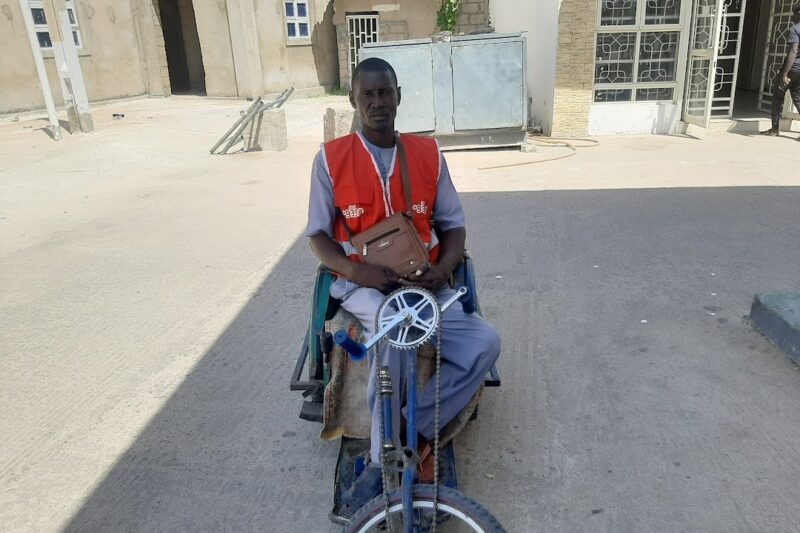Poorly implemented, the Discrimination Against Persons with Disabilities Act, like many other laws, often exists only on paper and fails to protect those who are physically challenged.
Physically disabled people remain a neglected part of society, often stigmatised, discriminated against and excluded from accessing basic social services.
Although the fundamental rights of all citizens – including disabled individuals – are enshrined in the 1999 Constitution of the Republic of Nigeria, people with physical challenges say that, like many other laws, the Discrimination Against Persons with Disabilities Act often exists only on paper.
“Passed in 2018, the Act is poorly implemented and has not been able to make a visible impact as far as the rights of physically challenged persons are concerned,” said Mohammed Abubakar, the chairperson of the Borno State chapter of the National Association of Persons with Physical Disabilities.
“Many of the rights the law was drafted to protect still remain unenforced.”
Abubakar was responding to complaints by individuals who said that they were unable to rent a house in Maiduguri, the state capital, because they were physically disabled.
“Discrimination against the physically disabled is not new or uncommon. Even though the right to freedom from discrimination is recognised in the international community as a human right and enshrined in the 1999 Constitution of the Federal Republic of Nigeria, physically disabled individuals are often victimised.
“They are stigmatised and experience barriers due to restriction of participation,” he said. “There have been many cases of landlords refusing to rent houses to persons with disabilities even though, by doing so, they are breaking the law.”
Abubakar said the discrimination was not motivated by a lack of finance.
“One of our members was prepared to pay more than ₦100,000 per annum to rent a house. It was only when the house agent or landlord discovered the prospective tenant was physically disabled that the deal fell through.”
“When challenged, the landlord claimed physically disabled people ruined the structures of a house, including the toilet facilities, and he accused them of being unable to keep the environment tidy.
“Of course, these accusations are patently untrue. They are baseless and unfounded – and they can have a devastating effect on the mindset of a disabled person. A disability can take away many aspects of an individual’s identity, leaving them questioning who they are, what their value is and where they fit in society. It’s easy to start feeling useless. Depression and other mental disorders are common.”
Abubakar said that the northeast of the country – and Borno State specifically – had the highest number of persons with physical disabilities, mainly as a result of the 15-year insurgency.
“The Borno State government needs to investigate this matter and take decisive action against the mistreatment of and discrimination against physically disabled persons by landlords and house agents.
“The government should provide houses or quarters purposely built for people living with physical disabilities. Failing that, it should provide land on the outskirts of towns within the state where disabled persons can at least build a thatch house or construct a tent where they can live with their families without any discrimination and mistreatment.
“Discrimination is an abuse of physically disabled persons,” Abubakar said.
Babagana Kolo is physically disabled. He told RNI that he had agreed to pay ₦70,000 a year to rent a house in Maiduguri. However, when he went to view the house, two tenants already living there saw that he was disabled and immediately spoke to the landlord, convincing him to change his mind.
“As soon as they saw me, they contacted the landlord. The next thing I knew, the landlord told me I could not rent the house and he refunded my money. He said the two tenants had complained because I was physically disabled.
“So, the level of discrimination has reached the point that, even if you have money, you cannot rent a house if you are physically disabled. It does not seem to matter whether an individual is blind, deaf or dumb. If you are physically impaired, you are treated like a person with leprosy,” Kolo said.
“It is time for the government to step up to stop landlords from abusing physically disabled people. It’s discrimination and it undermines the rights of physically challenged individuals.”
Yahaya Alhaji Dunoma, a legal practitioner based in Maiduguri, said the fundamental human rights of all Nigerians – including those with physical disabilities – were enshrined in the constitution and were irrevocable.
“Every Nigerian has a right to freedom from discrimination. No one may be discriminated against based on their ethnic group, place of origin, gender, religion or political opinion, or the circumstances of their birth. This, of course, includes all persons with disabilities, whatever the disability may be.”
Dunoma said there was no reason for anyone to mistreat – or discriminate against – a person who was physically challenged.
He said a physically disabled person should not be restricted from participating in any business transaction, including renting a house.
SHETTIMA LAWAN MONGUNO









